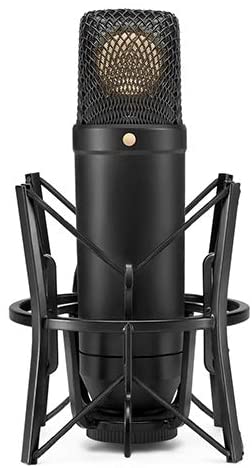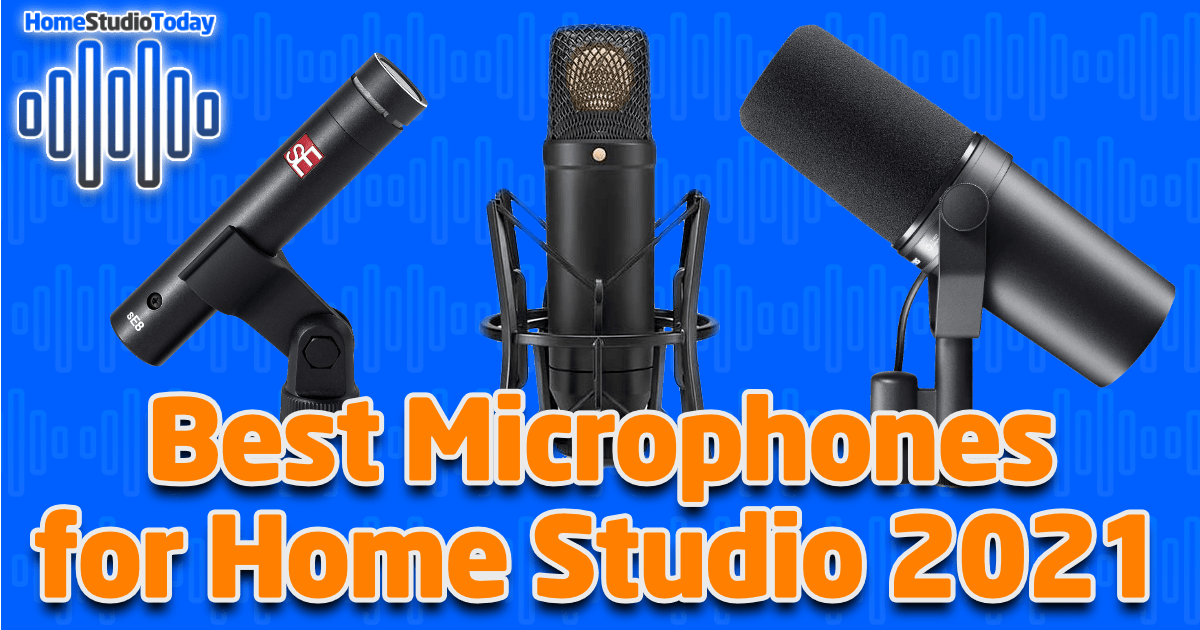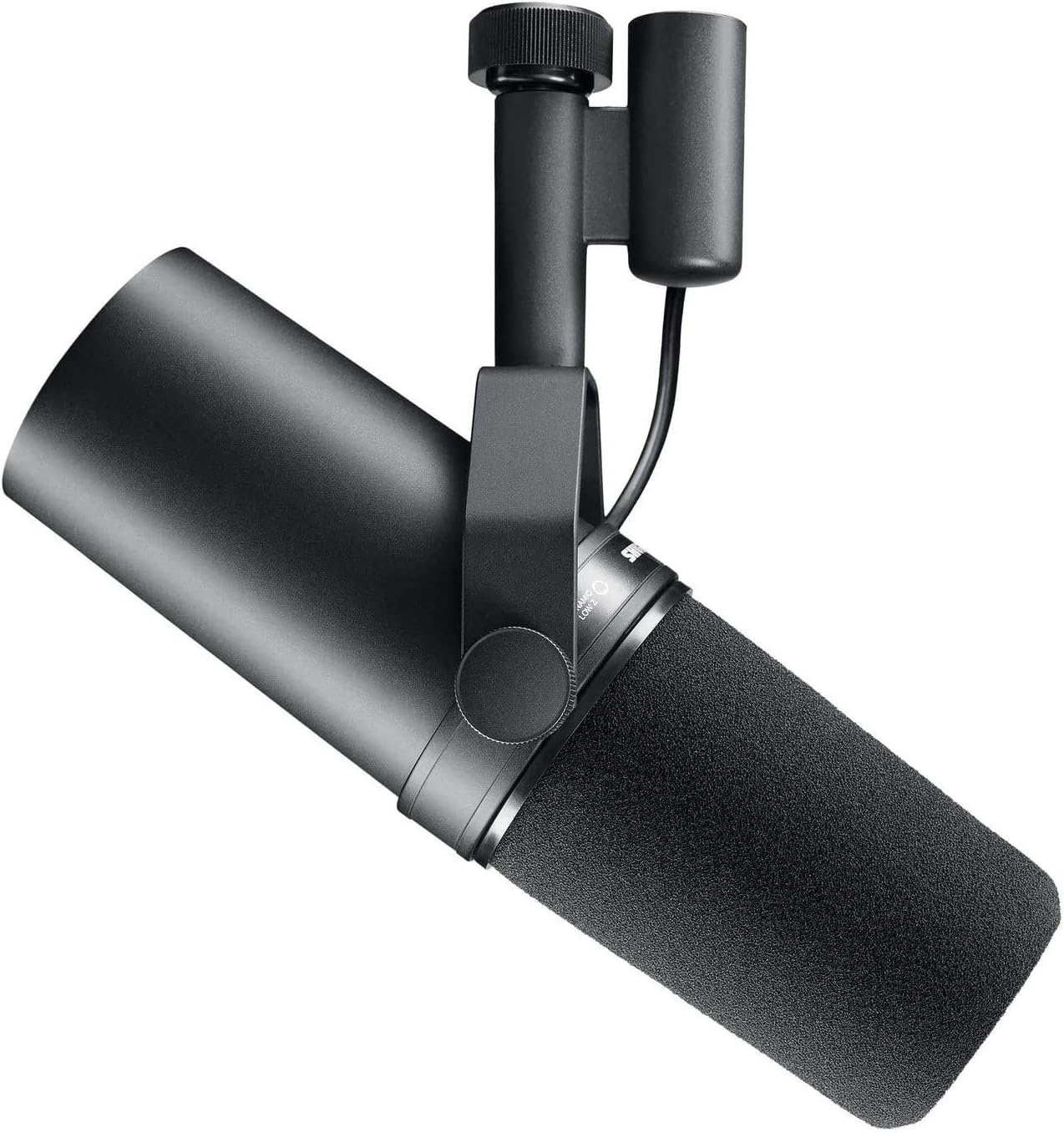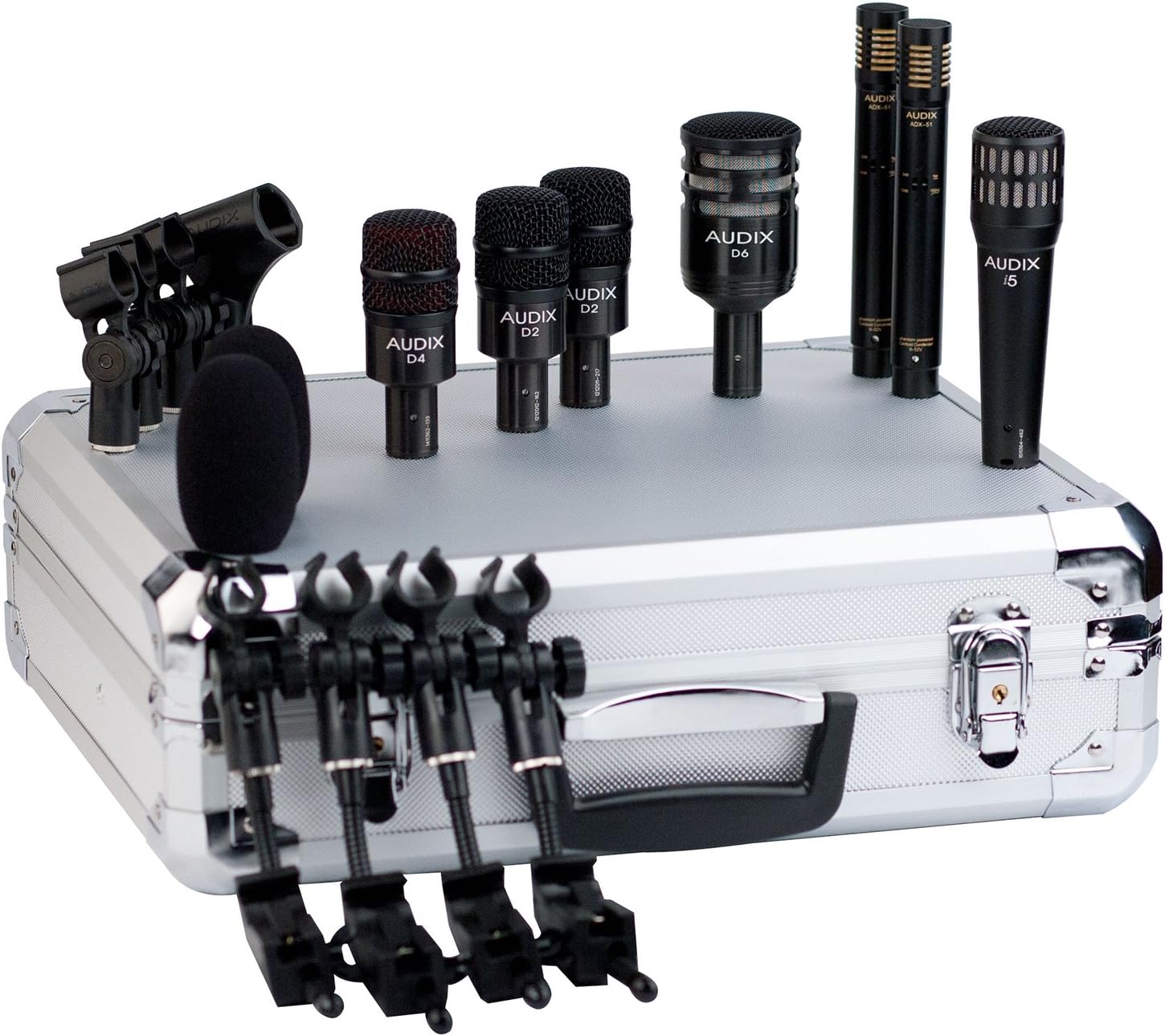There is very little else in your home studio that has the same impact on your sound as your microphones. Just a few mil of mylar stands between you and the sound you want, so choosing the right mic is of vital importance. With hundreds to choose from, what are the best microphones for home studio applications? Today we’re going to look at the most popular mic choices on the market, determine which mic types you’ll need, and help you choose the best options for each. First, let’s learn more about the different types of studio microphone and their various applications.
If you enjoy this best-of roundup and decide to grab one of the items listed, please consider clicking through one of my links before you buy. I earn a small commission at no cost to you, which helps support this site and keep these best-of lists coming. Thanks!
What Features Should I Look For in a Studio Microphone?

Simply put, a microphone’s job is to capture sounds. No matter how expensive a mic is, it will still invariably color your audio in some way. What makes a mic a good choice, then, is how it paints the sources you point it at as pleasantly as possible. In order to know which choices to make, you’ll need to understand the three main technologies that constitute modern mics.
Condenser Microphones
Condenser mics work by applying a voltage to a very thin material called a diaphragm, which is in close proximity to a much thicker backplate. When even the slightest sound vibrations strike the thin material, the distance between the diaphragm and the backplate changes, which varies the signal and transmits the sound. Because the diaphragm is so thin, condensers tend to be fragile and can be damaged if dropped or mishandled, but they are fantastic for recording vocals or instrumental performances with subtle nuance that other mics simply can’t capture. The voltage that is applied to the diaphragm is called phantom power and is supplied by a preamp or external power supply, which is required when using a condenser mic.
Dynamic Microphones
Dynamic mics use a far simpler electromagnetic circuit to collect and transmit sounds. Because of their simple design, they tend to stand up to abuse much better than other microphone types, but the tradeoff is that they don’t pick up quiet sounds and subtle nuance nearly as well as a condenser mic. Dynamic mics are ideal for louder applications like direct-miking amplifiers, powerful vocals, and loud instruments like brass, snares, and kick drums since they are able to handle much louder sounds than condenser mics without distorting or causing damage. Dynamic mics don’t require phantom power, but many producers do like to add a preamp or signal booster to dynamic mics to increase their output, saturation and overall sensitivity.
Ribbon Microphones
Ribbon mics use a super-thin ribbon of electrically conductive material strung between two magnets to pick up sound vibrations, similar to a condenser mic. They are the most expensive range of all the mics we’ve discussed, and as such are not necessarily the best choice for a beginner on a budget. For the dedicated studio hobbyist, however, they simply cannot be beaten when recording electric guitar cabinets, brass, and other loud instruments due to their ability to pick up detailed nuances similar to a condenser mic without distorting. They have a pleasing roll-off in the higher frequency range, which allows ribbons to have a darker character while removing some harshness from louder instruments. Ribbons have a built-in figure-eight pattern due to their construction, so they will pick up any reflected room noise – which may be your goal, depending on the application. Most ribbon mics cannot be used with phantom power, and can actually be permanently damaged if used incorrectly or handled roughly.
Best Microphones Under $100
Though there are only a few worthy mics in the sub-$100 price range, don’t mistake the price for a lack of value. Some of these mics are the most reliable, tried-and-true studio workhorses on the market.
(Please note that since studio gear goes in and out of stock frequently due to high demand and low supply, prices can and will vary. If the listed price for an item doesn’t fall within the category I’ve placed it in, it’s likely because it’s out of stock. In that case, you may want to seek out another vendor, pick a different item, or wait until the one you want is back in stock.)
Shure SM57
Common uses: Guitar and bass cabs, snares, toms, powerful vocals
Three words to describe the Shure SM57 – Affordable, durable, and reliable. The SM57 is considered by many to be the workhorse of studio dynamic mics. It’s not uncommon to see two or more deployed on a single guitar amp or drum kit piece to dial in the exact sound the engineer is looking for. At $100 apiece, you’ll have them forever.
Contoured frequency response for clean instrumental reproduction and rich vocal pickup. Professional-quality reproduction for drum, percussion, and instrument amplifier miking.
Audio-Technica AT2020
Common uses: Acoustic guitar, vocals, drum overheads, piano
The Audio Technica AT2020 has probably launched more small project studios than nearly any other mic in this price range. Good for recording vocals, acoustic guitars, and other quieter sources, It’s versatile, fairly rugged, and has a great sound for the money. Paired with another budget mic like the SM57, there’s not a lot you can’t do with this solid starter mic.
The price/performance standard in side address studio condenser microphone technology. Ideal for project/home studio applications. High SPL handling and wide dynamic range provide unmatched versatility.
sE Electronics SE7
Common uses: Acoustic guitar, piano, drum overheads
The sE Electronics SE7 is an affordable small-diaphragm pencil mic with switchable 20dB pad and 80Hz roll-off for cutting out boomy lows at the source. Paired with a large-diaphragm condenser or another SE7 in a matched pair, this is a great choice for recording acoustic guitars in stereo, drum overheads, piano, woodwinds, and other delicate sources.
Small-diaphragm cardioid condenser mic with switchable 80Hz high-pass filter and 20dB pad. Optimized acoustic design, discrete Class A circuitry, versatile attenuation, and a transformerless output. Delivers clear, natural sound at all frequencies on any source.
Best Microphones Under $200
AKG P420
Common uses: Guitar and bass cabs, drum overheads, acoustic guitar, vocals, piano, horns
The AKG P420 is a surprisingly quality and versatile mic for the price, with a ton of features that cannot be overlooked. Three switchable pickup patterns – cardioid, figure eight and omni – plus a 20dB pad, a 300Hz bass roll-off switch and a earsplittingly-high SPL of 155dB, this mic can be used for a ton of different things in your studio, including miking amps, recording very loud singers, drum overheads, and normal condenser applications like soft vocal and acoustic instrumentation. Comes with a high quality shock mount for reducing vibrations. At under $200 it’s hard to beat in terms of value and usability.
1-inch dual large-diaphragm condenser mic with three polar patterns - figure 8, cardioid, and omni. Switchable 300Hz low-end rolloff filter and 20dB pad. High SPL handling for versatile performance.
Shure BETA 52A
Common uses: Bass cabs, kick drums
For bringing out that low-end thump in your rhythm section, the Shure Beta 52A is a solid choice. Its frequency response is specifically tuned for enhanced proximity effect below 1kHz, making it perfect when stuck inside a kick drum or close-miked on a bass cab. Rugged Shure construction for a lifetime of use.
Frequency response shaped specifically for kick drums and bass instruments. Built-in dynamic locking stand adapter with integral XLR connector simplifies setup, especially inside a kick drum. Studio-quality performance, even at high sound pressure levels. Supercardioid pattern for high gain before feedback and superior rejection of unwanted noise.
Sennheiser e906
Common uses: Guitar and bass cabs, snare, toms, horns
With a flattened body designed for amp miking, the Sennheiser e906 is a favorite among guitarists for an easy one-mic solution. Includes a switch to adjust the mic’s response curve to three different tonal characters to dial in just the right sound for your particular amp cabinet. It’s also great for snares, toms, and brass.
Flat shape perfect for guitar amps. Reinforced metal body with 3-position switchable sound character - bright, moderate, or dark. Also great for drum close-miking.
Best Microphones Under $500
This price range is where some of the most popular budget condensers sit, as well as a few higher-end dynamic mics. Mics in this price range tend to be more specialized for a few uses, but the things they are designed for are what they do well.
Røde NT1
Common uses: Vocals, acoustic guitar, drum overheads
The Røde NT1 (not the NT1-A – spend the extra money and get the original) has been around since the early 90s and is regarded as one of the best low-cost condenser mics for vocals due to its warmer sound quality that is present but not harsh. It’s also great for acoustic guitar and drum overheads.
Features a sound signature reminiscent of the famous microphones of old while at the same time exhibiting extremely low self-noise. Suspended using Rycote’s Lyre system, minimizing external vibrations at the capsule level. Coated in a durable, military-grade ceramic layer to ensure an extremely hard-wearing finish.
AKG C214
Common uses: Vocals, guitar and bass cabs, acoustic guitar, drum overheads
AKG’s C414 is a revered mic in the music industry but costs quite the pretty penny, which led AKG to release the C214 as a less expensive alternative. Featuring a 20dB attenuation switch and low-pass filter, it’s usable in amp miking as well as a great vocal condenser, which has made it very popular among home studio engineers that want to buy one mic that ticks off several boxes. The $349 retail price makes it still among the more affordable options.
The sonic character of the C414 XLII in a more affordable package. Outstanding dynamic range and ultralow noise for close-up recording of high-output sources of up to 156dB SPL. Switchable 20dB pad and bass-cut filter for close-up recording and reduction of proximity effect.
Shure SM7B
Common uses: Powerful vocals, guitar and bass cabs, snares, toms, brass
Originally designed as a vocal booth mic for broadcasting, the Shure SM7B has gained favor among studio engineers for amp miking and reducing the harshness of louder instruments. Paired with a preamp or signal booster to increase the overall output gain, the SM7B is also a favorite of many famous engineers for capturing high-powered vocalists. The most expensive of the dynamics on our list at $400 retail.
Flat, wide-range frequency response for exceptionally clean and natural reproduction of both music and speech. Bass rolloff and presence boost controls. Improved rejection of electromagnetic hum. Highly effective pop filter eliminates need for any add-on protection.
sE Electronics sE8
Common uses: Drum overheads, room mics, acoustic guitar, piano
Switchable pads, low-cut filters, and a handmade capsule set the sE Electronics sE8 pencil mic apart from the crowd at a reasonable price point. I’ve heard several home acoustic guitar recordings done with a pair of sE8‘s that really blew my socks off. A factory-matched pair of these set up in a live room to capture whole bands or deployed as drum overheads is a fantastic investment. $250 apiece makes them a great value option among pencil mics.
Handcrafted, individually-tuned capsule with remarkably low self-noise. Low-cut and multi-position pad switches for a wide range of applications.
Shure PGADRUMKIT7
Common uses: Drum miking
At the lowest price point that I can honestly recommend for a complete drum solution, this kit includes seven industry-standard Shure mics – a kick, three tom/snares, one hat, and two rooms – at a very affordable price. This budget-friendly kit even includes three rim mounts and seven XLR cables, all for under $500. You can get better drum mics, but not for this price.
1 kick, 3 snare/tom, 1 hat, and 2 overhead mics, complete with mic mounts, clips, and cables. Comes with everything but the actual drum kit.
Sennheiser MD421 II
Common uses: Snares, toms, guitar and bass cabinets, brass, powerful vocals
The Sennheiser MD421 II is known primarily as a high-end drum mic but is also commonly used for miking guitar cabs, brass, and even vocal applications similar to the SM7B. It boasts a 5-position bass control to help shape low-end response, making it particularly good for miking bass amps and toms.
Rugged professional microphone with 5-position bass roll-off switch. Clear sound reproduction with solid feedback rejection. Great for bass and guitar cabs, toms, and other loud sources.
Best Microphones Over $500
As we move into our final price category, it’s easy to get a bit of sticker shock. Understand that these mics are the best of the best, and buying one of these assures you ultimate performance in a microphone that will last you a lifetime. Look up some of these mics and you’ll see that they have incredible resale value and only get better with age.
Warm Audio WA-87
Common uses: Vocals, drum overheads, piano, acoustic guitar
Warm Audio’s WA-87 has quickly made a name for itself as a Neumann U87 clone that actually provides a close match to the mid range warmth of a Neumann without the excessive pricetag. Many producers swear in online forums that they can’t tell the difference in a blind test, and at one sixth of the price of a real U87, the WA-87 is definitely worth a long look.
Based on early circuit designs of the classic U87 condenser mic, the WA-87 provides a warm, vintage tone. High-pass, multi-pattern, and pad switches.
Audix DP7
Common uses: Drum miking
Featuring seven extremely popular Audix drum mics in one kit for under $1,000, the value of the Audix DP7 drum mic kit is hard to ignore. The mics in this kit aren’t just any mics, they’re the flagship mics from Audix that normally retail for hundreds of dollars apiece. The kit includes one snare mic, two toms, one kick/ floor tom, one kick, and two overheads, plus four drum mounts and three mic clips.
7-piece drum mic package with Audix D6 flagship kick drum mic, two D2's for rack toms, one D4 for floor tom, the i5 for snare, and a pair of ADX51s for overhead miking. Also included are four D-Vice rim mount clips for the snare and tom mics and three heavy duty tension fit mic clips for the other three mics.
Royer R-121
Common uses: Guitar and bass cabs, brass, drum overhead
The favorite of engineers everywhere for its versatility and warmth, the Royer R-121 is the high-end secret sauce behind many popular albums. Direct-miking guitar and bass amps, brass, and even drum overheads benefit from its dark, signature sound.
Classic figure-8 pattern ribbon mic with high SPL, ideal for close-miking guitar amps, brass, and drums. Extremely low-noise with equal sensitivity on front and back.
Heil Sound HDK-8
Common uses: Drum miking
The all-dynamic Heil Sound HDK-8 kit features eight mics, plenty for miking up all but the very largest kits. Using dynamic mics for overheads sounds counter-intuitive, but can actually be an asset for less-than-ideal recording environments, as the limited response of a dynamic mic can reduce the boomy and ringing qualities of a room with poor acoustics while still keeping some of the desirable room reverb sound. At around $1500, it’s particularly good when paired with decent preamps on the overhead mics.
8 drum mics - 2 snare/hats, 3 toms, 2 overheads, and a kick - plus 3 mic mounts. Great off-axis rejection for reducing bleed. Sparkling upper-midrange and thumping lows.
Neumann U87 Ai
Common uses: Vocals, drum overheads, piano, acoustic guitar
The Neumann U87 Ai is the king of high end sticker shock, and is also considered by many to be the king of studio condenser mics. Nearly every pro recording studio has at least one Neumann U87 mic for a reason: the selectable patterns, warm sound signature, and high SPL allow the U87 to be used in a huge variety of recording scenarios. No list would be complete without its enormous price tag.
The most revered and sought-after studio mic of them all. 3 switchable polar patterns - omni, cardioid, and figure-8 - plus -10dB pad. Warm vintage Neumann sound.
Best Microphones for Home Studio 2021 – The Bottom Line
That’s it for our best of home studio microphones in 2021 round-up. Thanks to our Home Studio Enthusiasts Facebook Group for all of their opinions, as well as the thousands of user reviews online. If you still have questions about what is the best mic for your home studio, join the group and ask, we’re happy to help you out. Or stick around if you’d like to see the other best-of lists!


















